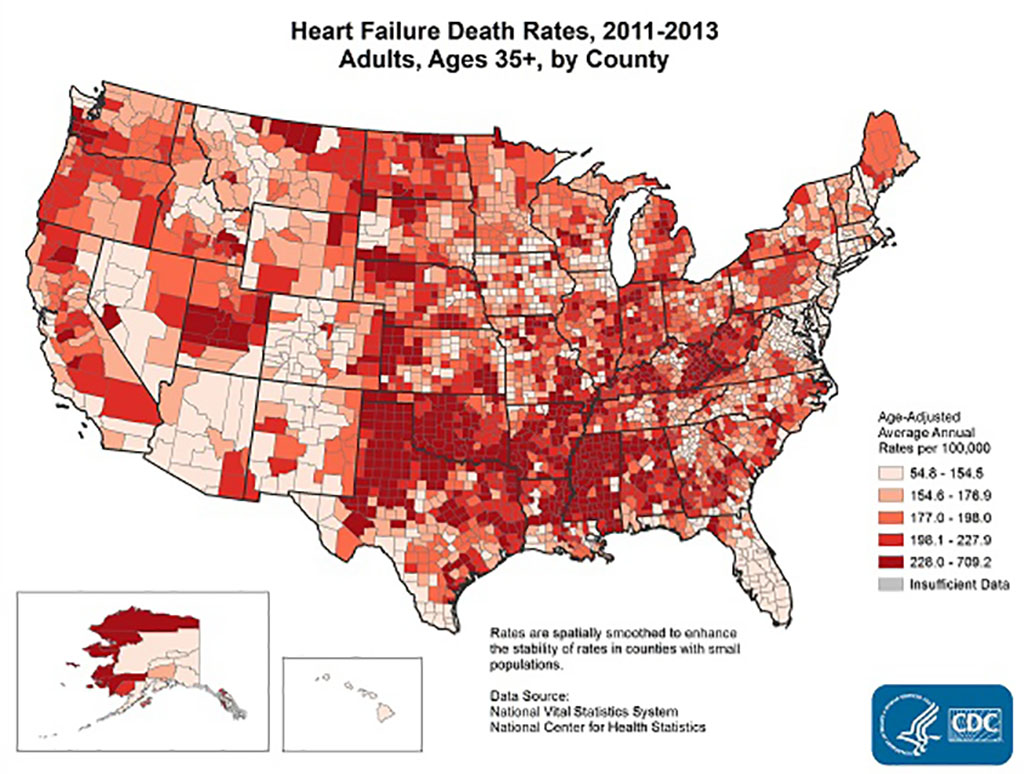Are You At Risk For Congestive Heart Failure?
Congestive heart failure, also known simply as heart failure or HF, happens when the heart cannot pump enough blood and oxygen to support other organs in your body. Heart failure is a serious condition, but it does not mean that the heart has stopped beating.
Congestive Heart Failure in the United States
- About 5.7 million adults in the United States have congestive heart failure.
- One in 9 deaths in 2009 included congestive heart failure as contributing cause.
- About half of people who develop congestive heart failure die within 5 years of diagnosis.
- Congestive heart failure costs the nation an estimated $30.7 billion each year. This total includes the cost of health care services, medications to treat heart failure, and missed days of work.
Deaths from Congestive Heart Failure Vary by Geography
Congestive heart failure is more common in some areas of the United States than in others. Below is a map showing the rate of death from heart failure by county during 2011–2013.

Risk Factors for Heart Failure
Diseases that damage your heart also increase your risk for congestive heart failure. Some of these diseases include- Coronary heart disease
- High blood pressure
- Diabetes
Unhealthy behaviors can also increase your risk for congestive heart failure, especially for people who have one of the diseases listed above. Unhealthy behaviors include
- Smoking tobacco
- Eating foods high in fat, cholesterol and sodium
- Not getting enough physical activity
- Being obese
Signs and Symptoms of Congestive Heart Failure
Common symptoms of congestive heart failure include
- Shortness of breath during daily activities
- Having trouble breathing when lying down
- Weight gain with swelling in the feet, legs, ankles or stomach
- Generally feeling tired or weak
Treating Congestive Heart Failure
Early diagnosis and treatment can improve quality and length of life for people who have congestive heart failure. Treatment usually involves taking medications, reducing sodium in the diet, and getting daily physical activity. People with congestive heart failure also track their symptoms each day so that they can discuss these symptoms with their health care team.
This content originally appeared at CDC.gov.
Related Articles
Answers About Coronary Artery Bypass Grafting (CABG)
Pritikin: Reducing Your Chances of Having a Second Heart Attack

CRH News
-
CRH recognized for excellence in lactation care
Jun 24, 2024, 15:26 by DeClue, A.In addition, the facility demonstrated that it has recently completed activities that help protect, promote, and support breastfeeding.Full story -
Take the ColumBUS Transit Survey
Jun 20, 2024, 08:33 by Newton, A.ColumBUS Transit is conducting a Route Study to look for opportunities to improve the service. Your input will help guide priorities and inform decisions about the future of public transit in our community.Full story -
Orthopedics and Sports Medicine practice moves to NexusPark
Jun 19, 2024, 14:24 by DeClue, A.CRH Orthopedics and Sports Medicine will open at NexusPark on July 1.Full story -
Memorial Day Holiday Physician Office Hours
May 22, 2024, 11:49 by DeClue, A.In observance of the Memorial Day holiday, most Columbus Regional Health Physicians offices and outpatient clinics will be closed on Monday, May 27, 2024.Full story -
Guardian Response Trains with CRH on Patient Transport
Apr 26, 2024, 15:25 by DeClue, A.On April 29 and May 2, Columbus Regional Health and area first responders will be conducting a training session in partnership with military representatives. This is a planned, simulated emergency drill.Full story -
Final Two CRH Practices Move to NexusPark
Apr 18, 2024, 12:36 by DeClue, A.CRH at NexusPark officially opened in late January, and more than 15 provider practices and services have relocated to the space in the first quarter of 2024.Full story

